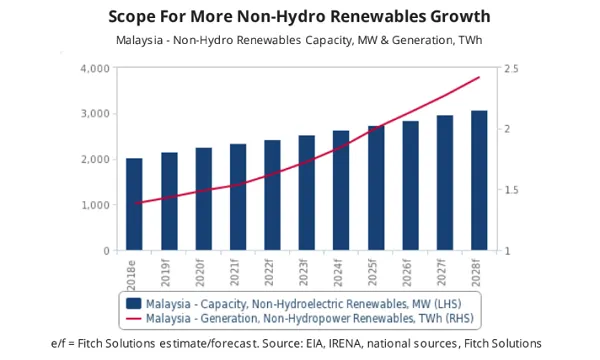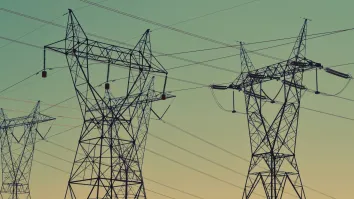
Malaysia's renewables capacity to grow by 1GW over reform rollout
A renewable energy certificate market is one of the initiatives to be launched end-2019.
Malaysia’s non-hydro renewables capacity is expected to grow by 1GW in the coming decade as it gears to boost the share of renewables (including hydro) in the power mix to 20% by 2025. The increased renewables capacity will be supported by strategies such as peer-to-peer electricity trading or transitioning toward a mandatory renewable energy certificate (REC) market, which is expected to be launched by the end of 2019.
Fitch Solutions said in a note, “We believe that the roadmap in particular will likely contain provisions and more specific actions to accelerate renewables growth, and together with the aforementioned factors, this represents an upside risk to our growth forecast. This figure will likely face an upward revision when we see more concrete announcements and developments over the coming quarters.”
The RECs market is not the only new initiative Malaysia plans to roll out. The government is currently looking to introduce more financing incentives into the sector, such as those similar to the existing Green Investment Tax Allowance and Green Technology Financing Scheme 2.0, and enhancing green energy trading with the private sector.
Also read: Malaysia rolls out investment reforms as renewables approach grid parity
Liberalisation efforts in order to boost private participation in the power market are also expected to further boost Malaysia’s Risk/Reward Index (RRI) profile.
The government announced that it will revive the special agency Malaysia Programme Office for Power Electricity Reform (MyPower), to drive the implementation of the Malaysia Energy Supply Industry (MESI) 2.0 initiative, which includes the liberalisation of the retail market. This initiative is expected to be launched in late 2019.
“The issue is still being studied at present and we believe that the government may seek to emulate the success with countries such as Singapore and Japan by first introducing a wholesale market,” Fitch Solutions said.
Majority state-owned Tenaga Nasional Berhad also proposed in July 2019 an internal restructuring of their generation, transmission, and retail divisions of the business. This is expected to be completed by Q3 2020, with the transfer of legal assets and liability to begin in H1 2020.
Also read: Malaysia's Tenaga Nasional Berhad to restructure amidst market liberalisation
With these initiatives, the solar sector is particularly well poised for more growth, thanks to the relatively high irradiation levels in the country and an established solar manufacturing sector, although most of the solar equipment is being exported at present.
Fitch Solutions explained, “The expanding domestic manufacturing base for renewables components will ensure that there is a reliable and low-cost supply chain for project developers, amidst global falling technology costs. We believe that this will be a key supportive factor to the Malaysian solar industry over the coming year, as greater numbers of manufacturers set up in the country.”

Following the significant oversubscription of solar auctions in their first two capacity tenders, the Energy Commission of Malaysia issued an RfP for the development of large-scale PV power plants with a targeted capacity of 500MW in Peninsular Malaysia at the start of 2019.
As of September 2019, Malaysia has launched 365MW, and bid prices went to a record low of $0.04/kWh (MYR 0.18/kWh), which has fallen lower than the price for gas-fired power in the country. In line with this, the government has announced plans to host more bids for large-scale solar projects, particularly as they try to boost the Net Energy Metering scheme via the use of solar, Fitch Solutions noted.



















 Advertise
Advertise




